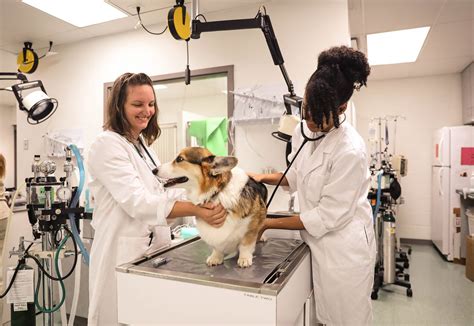Pursuing a career in veterinary technology is an enriching and rewarding endeavor, but it’s essential to consider the financial implications involved. This detailed guide will provide you with a comprehensive overview of the cost of Baker College’s Veterinary Technician program.

Tuition and Fees
The tuition and fees for Baker College’s Veterinary Technician program vary depending on the campus location and the number of credits taken per semester. As of 2023, the estimated cost per credit hour is:
Campus Location | Credit Hour Cost
—|—|
Auburn Hills | $490
Cadillac | $490
Coldwater | $450
Jackson | $450
Lansing | $450
Muskegon | $450
Owosso | $450
Port Huron | $450
Program Length and Total Cost
The Veterinary Technician program at Baker College is typically a 2-year associate degree program consisting of 72 credit hours. Based on the estimated credit hour cost, the total tuition and fees for the program range from approximately $32,400 to $35,280.
Campus Location | Total Tuition and Fees
—|—|
Auburn Hills | $35,280
Cadillac | $35,280
Coldwater | $32,400
Jackson | $32,400
Lansing | $32,400
Muskegon | $32,400
Owosso | $32,400
Port Huron | $32,400
Additional Expenses
In addition to tuition and fees, there are several other expenses to consider when pursuing the Veterinary Technician program at Baker College:
Expense | Estimated Cost
—|—|
Books and Supplies | $1,500 – $2,500
Uniforms | $500 – $1,000
Medical Insurance | $500 – $1,500
Living Expenses (housing, food, transportation) | $10,000 – $20,000 per year
Financial Aid Options
Baker College offers various financial aid options to assist students with the cost of the Veterinary Technician program, including:
- Federal Pell Grants
- Federal Supplemental Educational Opportunity Grants (FSEOG)
- Federal Work-Study Program
- Scholarships
- Loans
Common Mistakes to Avoid
When navigating the financial aspects of the Veterinary Technician program, avoid these common mistakes:
- Not budgeting adequately. Create a detailed budget that includes all expenses associated with the program.
- Delaying financial aid applications. Apply for financial aid as early as possible to secure the best options.
- Ignoring scholarship opportunities. Research and apply for scholarships that align with your academic achievements and career goals.
- Not exploring loan repayment options. Understand the different loan repayment plans available to avoid financial hardship in the future.
FAQs
Q: What is the average salary for a veterinary technician?
A: According to the U.S. Bureau of Labor Statistics, the median annual salary for veterinary technicians was $37,240 in May 2022.
Q: Is the Veterinary Technician program at Baker College accredited?
A: Yes, the program is accredited by the American Veterinary Medical Association (AVMA).
Q: How long does it take to complete the Veterinary Technician program?
A: The program typically takes 2 years to complete if enrolled full-time or 3-4 years if enrolled part-time.
Q: Are there any scholarships available for veterinary technology students?
A: Yes, Baker College offers various scholarships specifically for students enrolled in the Veterinary Technician program.
Q: Can I get a job as a veterinary technician without a degree?
A: Most states require veterinary technicians to be licensed, and a degree from an accredited program is a prerequisite for licensure.
Q: What are the job prospects for veterinary technicians?
A: The job outlook for veterinary technicians is expected to be excellent over the next decade due to the increasing demand for animal healthcare services.
Table 1: Campus Locations and Tuition Costs
| Campus Location | Tuition Cost per Credit Hour |
|---|---|
| Auburn Hills | $490 |
| Cadillac | $490 |
| Coldwater | $450 |
| Jackson | $450 |
| Lansing | $450 |
| Muskegon | $450 |
| Owosso | $450 |
| Port Huron | $450 |
Table 2: Estimated Total Tuition and Fees
| Campus Location | Total Tuition and Fees |
|---|---|
| Auburn Hills | $35,280 |
| Cadillac | $35,280 |
| Coldwater | $32,400 |
| Jackson | $32,400 |
| Lansing | $32,400 |
| Muskegon | $32,400 |
| Owosso | $32,400 |
| Port Huron | $32,400 |
Table 3: Estimated Additional Expenses
| Expense | Estimated Cost |
|---|---|
| Books and Supplies | $1,500 – $2,500 |
| Uniforms | $500 – $1,000 |
| Medical Insurance | $500 – $1,500 |
| Living Expenses | $10,000 – $20,000 per year |
Table 4: Financial Aid Options
| Financial Aid Option | Eligibility Criteria | Amount |
|---|---|---|
| Federal Pell Grants | Income-based | Up to $6,895 per year |
| Federal Supplemental Educational Opportunity Grants (FSEOG) | Income-based and academic merit | Up to $4,000 per year |
| Federal Work-Study Program | Income-based | Students work part-time on campus |
| Scholarships | Academic achievement, extracurricular activities, community service | Varies |
| Loans | Credit-based | Varies |
